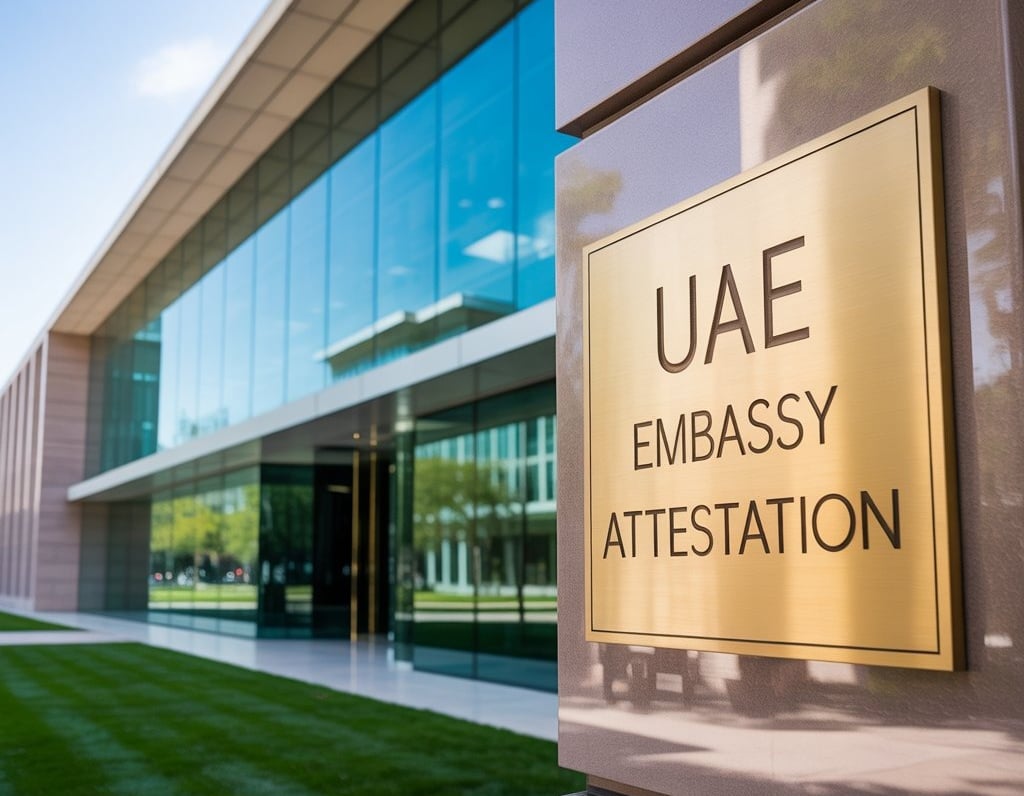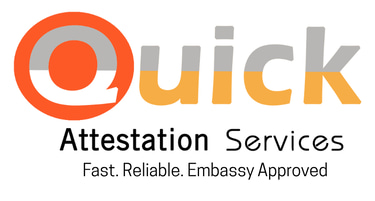Complete UAE Embassy Attestation Checklist 2025
Discover the essential steps and requirements for UAE embassy attestation in 2025. This comprehensive checklist guides you on how to attest documents in the UAE, ensuring a smooth process for all your attestation needs.
11/22/20257 min read


Introduction to UAE Embassy Attestation
UAE Embassy Attestation refers to the official verification process in which documents are authenticated by the UAE embassy or consulate in a foreign country. This process is crucial for individuals and businesses intending to use official documents such as birth certificates, marriage certificates, educational degrees, and commercial contracts in the UAE. By undergoing this attestation, documents gain legal recognition in the UAE, ensuring their acceptance by local authorities and institutions.
Significance of UAE Embassy Attestation cannot be overstated, especially considering the increasing number of international business transactions and immigration cases. As more individuals and companies engage with the UAE, the need to ensure that the documents presented are credible and valid becomes paramount. UAE Embassy Attestation serves as a safeguard against fraudulent documentation and establishes trust, facilitating smooth administrative processes within the UAE’s jurisdiction.
The role of attestation is not confined to mere validation; it also embodies compliance with the legal requirements set forth by the UAE government. For instance, expatriates needing to establish residency or secure employment must present attested documents, highlighting the essential nature of this process. Additionally, many businesses aim to expand their operations in the UAE, necessitating the attestation of various legal and commercial documents to ensure they meet local regulatory standards.
In summary, the growing necessity for UAE Embassy Attestation arises from the increasing complexities of global commerce and migration. Understanding the importance of this process is critical for anyone planning to engage with the UAE, whether for personal or professional reasons. Hence, ensuring that documents are appropriately attested can streamline various proceedings, ultimately enhancing the legal standing of paperwork across borders.
Types of Documents Requiring Attestation
When engaging in international processes such as employment, education, or business transactions in the UAE, it is crucial to understand the various types of documents that necessitate UAE Embassy Attestation. This formal process is designed to authenticate the legitimacy of the documents, ensuring they are recognized by the UAE authorities and facilitating their acceptance in official matters.
Firstly, educational certificates are one of the primary documents requiring attestation. This includes not only degrees but also diplomas and transcripts. Individuals seeking employment in the UAE may be asked to provide attested educational certificates to validate their qualifications. Moreover, students planning to pursue higher education in UAE institutions will also need to attest their academic documents.
Marriage certificates also fall under the category of documents requiring attestation. For expatriates who wish to register their marriage in the UAE or seek residency visas based on marital status, presenting an attested marriage certificate is essential. The attestation verifies the authenticity of the document, helping ensure that legal relationships are formally recognized.
Birth certificates are another important document that requires attestation, particularly for expatriate parents. When applying for residency visas for their children or seeking education opportunities, parents must provide an attested birth certificate. This ensures that the child's identity and parentage are officially recognized by the UAE authorities.
In addition to personal documents, commercial documents also require attestation. Businesspersons often need to have their commercial licenses, partnership agreements, and company incorporation documents attested to facilitate trade operations within the UAE. This process enhances the credibility of business transactions and helps in securing necessary government permissions.
Lastly, medical documents, including vaccination records and medical reports, may be subject to attestation, especially for individuals seeking medical care or employment in healthcare sectors. Attesting medical records confirms their authenticity, thereby streamlining interactions with healthcare providers in the UAE.
Step-by-Step Attestation Process
The attestation process for documents intended for use in the UAE involves a series of crucial steps that ensure the authenticity and legality of the documents in question. The first phase begins with the preparation of the necessary documents. It is essential to gather all relevant original documents along with required photocopies. Common documents include educational certificates, marriage certificates, and personal identification documents.
Once the documents are assembled, the next step is obtaining notarization. This is typically done through a registered notary public. The notary public will verify the authenticity of the documents and attest to their validity by providing an official seal and signature. This notarization is a prerequisite for proceeding with the attestation, as it establishes a foundation of trustworthiness for the subsequent steps.
Following notarization, the documents must be submitted to the relevant government bodies. This usually involves the Ministry of Foreign Affairs and International Cooperation (MOFAIC) or other local authorities, depending on the nature of the documents. During this stage, applicants may be required to pay appropriate fees and provide additional identification or proof of residency.
After clearance from the local authorities, the documents are ready for submission to the UAE Embassy or Consulate. Each UAE Embassy has specific requirements regarding document submissions, so it is vital to check the guidelines on their official website or contact the embassy directly for precise instructions. Be prepared for another round of fees and possible wait times for processing. Importantly, ensure that all documents, including those already notarized and authenticated by local authorities, are presented in adherence to the embassy's format.
Completing these steps will facilitate a smoother attestation experience, ultimately validating documents for official use in the UAE.
Required Documents for UAE Embassy Attestation
To successfully navigate the UAE embassy attestation process, it is imperative to gather all necessary documents accurately. This checklist includes essential documents for various types of attestation, ensuring that individuals are well-prepared prior to submission. The requirements might differ depending on the type of document you are seeking to have attested, such as educational certificates, commercial documents, or personal documents like birth or marriage certificates.
For educational certificates, the prerequisites typically include the original certificate along with a photocopy, and in certain cases, academic transcripts. Moreover, a verification letter from the educational institution may be required for some types of degrees. This step consolidates the authenticity of the documents presented for attestation.
In the case of commercial documents, such as business licenses or incorporation documents, submit the original documents along with their copies. Additionally, a notarized copy may be necessary to further uphold the legitimacy of the paperwork. For personal documents like birth and marriage certificates, the originals should be provided, as well as any required proofs of identity, such as a passport or national ID card, to verify the applicant's identity.
It should be noted that all documents presented for UAE embassy attestation must be original. Photocopies or scanned documents are generally not accepted during the attestation process. Prior to submission, individuals should meticulously review their documents to guarantee that all information is accurate and complete, as discrepancies may lead to delays or rejections. Collecting the correct documents not only streamlines the attestation process but also ensures compliance with the UAE embassy's stringent requirements.
Processing Time and Fees Involved
The processing time for UAE Embassy Attestation can vary significantly based on several factors, including the type of document, the complexity of the case, and the urgency request of the applicant. Generally, standard processing times range from three to ten business days. However, for individuals seeking expedited services, some embassies offer express processing options, which typically reduce the waiting period to one to three business days. It is essential to realize that additional validation procedures may apply to specific documents, potentially extending processing times.
In parallel with the processing time considerations, applicants must also evaluate the fees associated with UAE Embassy Attestation. The total cost generally comprises government fees, service charges, and potential expedited processing fees. Government fees typically range from AED 150 to AED 500, depending on the type of document being attested, such as educational certificates, commercial documents, or personal records. Service charges levied by the attestation service provider may incur additional costs ranging from AED 50 to AED 300, which cover administrative and handling expenses.
For individuals opting for expedited processing, applicants should anticipate additional costs, often around AED 100 to AED 500, on top of the standard processing fees. This fee modification is introduced to facilitate faster processing and ensure that expeditious requests are prioritized. Therefore, understanding the complete financial implications of the attestation process is crucial for applicants to budget accordingly.
Ultimately, individuals are encouraged to contact the relevant UAE Embassy or a reputable attestation service provider to receive precise estimates concerning both processing times and fees, as these factors may fluctuate based on the particulars of each case.
Common Challenges and How to Overcome Them
Throughout the UAE embassy attestation process, various challenges may arise that can hinder the successful completion of the procedure. Understanding these common issues is paramount for individuals and businesses seeking verification of their documents. One prevalent challenge is document rejection, which can occur due to inaccuracies or inconsistencies in the documents submitted. For instance, discrepancies in names, dates, or signatures can result in a rejection. To mitigate such risks, it is advisable to double-check all documents for accuracy before submission. Additionally, ensuring that all required documents are duly notarized and formatted according to the UAE embassy’s specifications can help in avoiding rejections.
Delays are another significant challenge that applicants often face. These can stem from a high volume of applications, complex verification processes, or even unforeseen circumstances such as public holidays. To navigate this obstacle, it is crucial to plan ahead and submit applications well before any critical deadlines. Keeping communication lines open with the embassy or authorized agent can provide applicants with valuable updates on their application status, allowing them to stay informed about any potential delays.
Furthermore, missing information can lead to complications and extend the attestation timeline. It is essential to compile a comprehensive list of all necessary documents and ensure that each one is accounted for before initiation of the attestation process. Utilizing checklists can serve as an effective tool in ensuring that nothing is overlooked. Additionally, working with professional services that specialize in UAE embassy attestation can provide an added layer of assurance, as experienced agents will typically be familiar with the requirements and can proactively address any missing information. By recognizing these common challenges, individuals can better prepare and streamline their attestation experience.
Conclusion and Best Practices
Proper document attestation plays a crucial role in ensuring that your documents are recognized and accepted in the United Arab Emirates. As the world becomes increasingly interconnected, the demand for officially authenticated documents, particularly for purposes such as employment, education, and residency, has surged. Hence, understanding the UAE Embassy attestation process becomes essential for individuals seeking to migrate or establish a business in the UAE.
To navigate this intricate process successfully, it is vital to adopt best practices. First and foremost, one should gather all necessary documents well in advance. This includes educational certificates, marriage licenses, and any other pertinent paperwork that requires attestation. Ensuring that these documents are complete and accurate can significantly expedite the attestation process.
Moreover, it is advisable to familiarize oneself with the specific requirements and procedures of the UAE Embassy regarding document attestation. Different documents might necessitate different approaches or additional steps, such as securing authentication from local authorities or ministries before applying to the embassy. Staying informed about the latest regulations and requirements will be invaluable for a smooth experience.
Additionally, utilizing resources such as official government websites, consulting with legal experts, or engaging service providers specializing in document attestation can further enhance one’s readiness. These resources not only offer guidance but can also help alleviate any uncertainties regarding what is required for successful UAE Embassy attestation.
In conclusion, by being well-prepared and utilizing the available resources, individuals can streamline the attestation process, thereby avoiding potential delays and complications. Proper document attestation ultimately serves as a key facilitator in establishing one’s professional and personal endeavors in the UAE.
